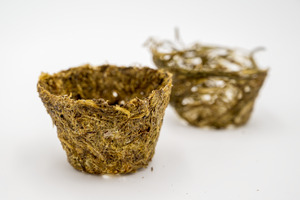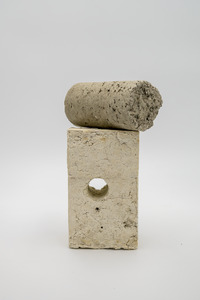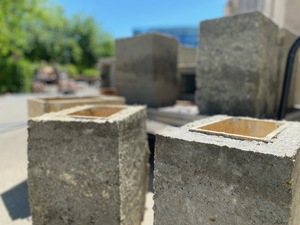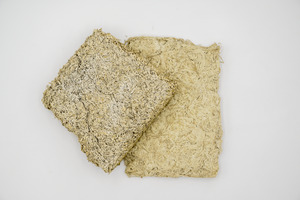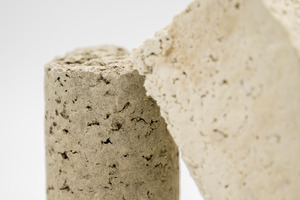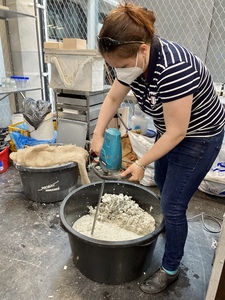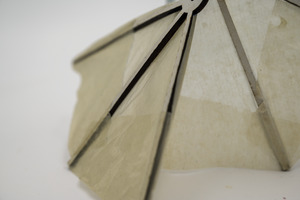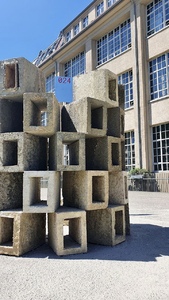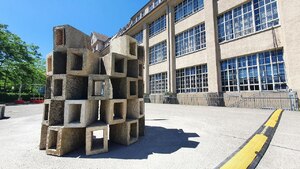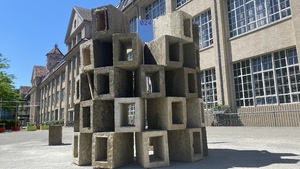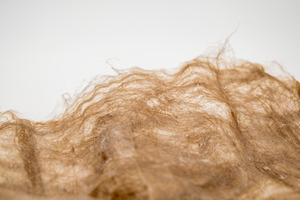"Staatliche Hochschule für Gestaltung (HfG) Karlsruhe"
| Begriff | Staatliche Hochschule für Gestaltung (HfG) Karlsruhe |
| Metakey | Ort: Institution (creative_work:location_institution) |
| Typ | Keyword |
| Vokabular | Werk |
636 Inhalte
- Seite 1 von 53
Starch-Based Bioplastic
- Titel
- Starch-Based Bioplastic
- Titel (en)
- There are Biocomposites Growing in My Garden
- Beschreibung (de)
- Fotografien der Endergebnisse von dem Workshop „There are Biocomposites Growing in my Garden“ geleitet von Kim André Lange, Julia Ihls und Ina Grabosch.
- Beschreibung (en)
- Photographs of the final results from the workshop "There are Biocomposites Growing in my Garden" led by Kim André Lange, Julia Ihls and Ina Grabosch
- Typ des Projekts/Werks
- Schlagworte
- Datierung
- 20.11.2020 - 22.11.2020
- Mitwirkende
- Material
- Ort: Institution
- Stadt
- Land
- Beteiligte Institution(en)
- Titel
- Starch-Based Bioplastic
- Urheberrechtshinweis
- Bio Design Lab, Anthea Oestreicher
- Rechtsschutz/Lizenz
- Medienersteller/in
- Projektleiter/in
- Semester
- Lehrveranstaltung
- Importiert am
- 26.10.2023
- Übergeordnete Sets
- 2
Papercrete
- Titel
- Papercrete
- Titel (en)
- Biosensorium
- Beschreibung (de)
- Fotografien der während des Seminar „Biosensorium“ entstandenen Material-Samples.
- Beschreibung (en)
- Photographs of the material samples created during the "Biosensorium" seminar.
- Typ des Projekts/Werks
- Schlagworte
- Datierung
- Sommersemester 2021
- Mitwirkende
- Material
- Ort: Institution
- Ort
- Biosensorium
- Stadt
- Land
- Beteiligte Institution(en)
- Titel
- Papercrete
- Urheberrechtshinweis
- Bio Design Lab, Anthea Oestreicher
- Rechtsschutz/Lizenz
- Medienersteller/in
- Projektleiter/in
- Semester
- Lehrveranstaltung
- Importiert am
- 26.10.2023
- Übergeordnete Sets
- 1
Papercrete in the Making
- Titel
- Papercrete in the Making
- Titel (en)
- Biosensorium
- Beschreibung (de)
- Fotografien der während des Seminar „Biosensorium“ entstandenen Material-Samples.
- Beschreibung (en)
- Photographs of the material samples created during the "Biosensorium" seminar.
- Typ des Projekts/Werks
- Schlagworte
- Datierung
- Sommersemester 2021
- Mitwirkende
- Material
- Ort: Institution
- Ort
- Biosensorium
- Stadt
- Land
- Beteiligte Institution(en)
- Titel
- Papercrete in the Making
- Urheberrechtshinweis
- Bio Design Lab, Julia Ihls
- Rechtsschutz/Lizenz
- Medienersteller/in
- Projektleiter/in
- Semester
- Lehrveranstaltung
- Importiert am
- 26.10.2023
- Übergeordnete Sets
- 1
Hempcrete
- Titel
- Hempcrete
- Titel (en)
- Biosensorium
- Beschreibung (de)
- Fotografien der während des Seminar „Biosensorium“ entstandenen Material-Samples.
- Beschreibung (en)
- Photographs of the material samples created during the "Biosensorium" seminar.
- Typ des Projekts/Werks
- Schlagworte
- Datierung
- Sommersemester 2021
- Mitwirkende
- Ort: Institution
- Ort
- Biosensorium
- Stadt
- Land
- Beteiligte Institution(en)
- Titel
- Hempcrete
- Urheberrechtshinweis
- Bio Design Lab, Anthea Oestreicher
- Rechtsschutz/Lizenz
- Medienersteller/in
- Projektleiter/in
- Semester
- Lehrveranstaltung
- Importiert am
- 26.10.2023
- Übergeordnete Sets
- 1
Starch-Based Bioplastic
- Titel
- Starch-Based Bioplastic
- Titel (en)
- Biosensorium
- Beschreibung (de)
- Fotografien der während des Seminar „Biosensorium“ entstandenen Material-Samples.
- Beschreibung (en)
- Photographs of the material samples created during the "Biosensorium" seminar.
- Typ des Projekts/Werks
- Schlagworte
- Datierung
- Sommersemester 2021
- Mitwirkende
- Material
- Ort: Institution
- Ort
- Biosensorium
- Stadt
- Land
- Beteiligte Institution(en)
- Titel
- Starch-Based Bioplastic
- Urheberrechtshinweis
- Bio Design Lab, Anthea Oestreicher
- Rechtsschutz/Lizenz
- Medienersteller/in
- Projektleiter/in
- Semester
- Lehrveranstaltung
- Importiert am
- 26.10.2023
- Übergeordnete Sets
- 1
Papercrete
- Titel
- Papercrete
- Titel (en)
- Biosensorium
- Beschreibung (de)
- Fotografien der während des Seminar „Biosensorium“ entstandenen Material-Samples.
- Beschreibung (en)
- Photographs of the material samples created during the "Biosensorium" seminar.
- Typ des Projekts/Werks
- Schlagworte
- Datierung
- Sommersemester 2021
- Mitwirkende
- Material
- Ort: Institution
- Ort
- Biosensorium
- Stadt
- Land
- Beteiligte Institution(en)
- Titel
- Papercrete
- Urheberrechtshinweis
- Bio Design Lab, Anthea Oestreicher
- Rechtsschutz/Lizenz
- Medienersteller/in
- Projektleiter/in
- Semester
- Lehrveranstaltung
- Importiert am
- 26.10.2023
- Übergeordnete Sets
- 1
Papercrete in the Making
- Titel
- Papercrete in the Making
- Titel (en)
- Biosensorium
- Beschreibung (de)
- Fotografien der während des Seminar „Biosensorium“ entstandenen Material-Samples.
- Beschreibung (en)
- Photographs of the material samples created during the "Biosensorium" seminar.
- Typ des Projekts/Werks
- Schlagworte
- Datierung
- Sommersemester 2021
- Mitwirkende
- Material
- Ort: Institution
- Ort
- Biosensorium
- Stadt
- Land
- Beteiligte Institution(en)
- Titel
- Papercrete in the Making
- Urheberrechtshinweis
- Bio Design Lab, Julia Ihls
- Rechtsschutz/Lizenz
- Medienersteller/in
- Projektleiter/in
- Semester
- Lehrveranstaltung
- Importiert am
- 26.10.2023
- Übergeordnete Sets
- 1
Oilpaper
- Titel
- Oilpaper
- Titel (en)
- Biosensorium
- Beschreibung (de)
- Fotografien der während des Seminar „Biosensorium“ entstandenen Material-Samples.
- Beschreibung (en)
- Photographs of the material samples created during the "Biosensorium" seminar.
- Typ des Projekts/Werks
- Schlagworte
- Datierung
- Sommersemester 2021
- Mitwirkende
- Ort: Institution
- Ort
- Biosensorium
- Stadt
- Land
- Beteiligte Institution(en)
- Titel
- Oilpaper
- Urheberrechtshinweis
- Bio Design Lab, Anthea Oestreicher
- Rechtsschutz/Lizenz
- Medienersteller/in
- Projektleiter/in
- Semester
- Lehrveranstaltung
- Importiert am
- 26.10.2023
- Übergeordnete Sets
- 1
Biosensorium - Living Pavillion
- Titel
- Biosensorium - Living Pavillion
- Titel (en)
- Biosensorium
- Beschreibung (de)
- Fotografien der während des Seminar „Biosensorium“ entstandenen Material-Samples.
- Beschreibung (en)
- Photographs of the material samples created during the "Biosensorium" seminar.
- Typ des Projekts/Werks
- Schlagworte
- Datierung
- Sommersemester 2021
- Mitwirkende
- Material
- Ort: Institution
- Ort
- Biosensorium
- Stadt
- Land
- Beteiligte Institution(en)
- Titel
- Biosensorium - Living Pavillion
- Urheberrechtshinweis
- Bio Design Lab
- Rechtsschutz/Lizenz
- Medienersteller/in
- Projektleiter/in
- Semester
- Lehrveranstaltung
- Importiert am
- 26.10.2023
- Übergeordnete Sets
- 1
Biosensorium - Living Pavillion
- Titel
- Biosensorium - Living Pavillion
- Titel (en)
- Biosensorium
- Beschreibung (de)
- Fotografien der während des Seminar „Biosensorium“ entstandenen Material-Samples.
- Beschreibung (en)
- Photographs of the material samples created during the "Biosensorium" seminar.
- Typ des Projekts/Werks
- Schlagworte
- Datierung
- Sommersemester 2021
- Mitwirkende
- Material
- Ort: Institution
- Ort
- Biosensorium
- Stadt
- Land
- Beteiligte Institution(en)
- Titel
- Biosensorium - Living Pavillion
- Urheberrechtshinweis
- Bio Design Lab
- Rechtsschutz/Lizenz
- Medienersteller/in
- Projektleiter/in
- Semester
- Lehrveranstaltung
- Importiert am
- 26.10.2023
- Übergeordnete Sets
- 1
Biosensorium - Living Pavillion
- Titel
- Biosensorium - Living Pavillion
- Titel (en)
- Biosensorium
- Beschreibung (de)
- Fotografien der während des Seminar „Biosensorium“ entstandenen Material-Samples.
- Beschreibung (en)
- Photographs of the material samples created during the "Biosensorium" seminar.
- Typ des Projekts/Werks
- Schlagworte
- Datierung
- Sommersemester 2021
- Mitwirkende
- Material
- Ort: Institution
- Ort
- Biosensorium
- Stadt
- Land
- Beteiligte Institution(en)
- Titel
- Biosensorium - Living Pavillion
- Urheberrechtshinweis
- Bio Design Lab
- Rechtsschutz/Lizenz
- Medienersteller/in
- Projektleiter/in
- Semester
- Lehrveranstaltung
- Importiert am
- 26.10.2023
- Übergeordnete Sets
- 1
Starch-Based Bioplastic
- Titel
- Starch-Based Bioplastic
- Titel (en)
- Biosensorium
- Beschreibung (de)
- Fotografien der während des Seminar „Biosensorium“ entstandenen Material-Samples.
- Beschreibung (en)
- Photographs of the material samples created during the "Biosensorium" seminar.
- Typ des Projekts/Werks
- Schlagworte
- Datierung
- Sommersemester 2021
- Mitwirkende
- Material
- Ort: Institution
- Ort
- Biosensorium
- Stadt
- Land
- Beteiligte Institution(en)
- Titel
- Starch-Based Bioplastic
- Urheberrechtshinweis
- Bio Design Lab, Anthea Oestreicher
- Rechtsschutz/Lizenz
- Medienersteller/in
- Projektleiter/in
- Semester
- Lehrveranstaltung
- Importiert am
- 26.10.2023
- Übergeordnete Sets
- 1
